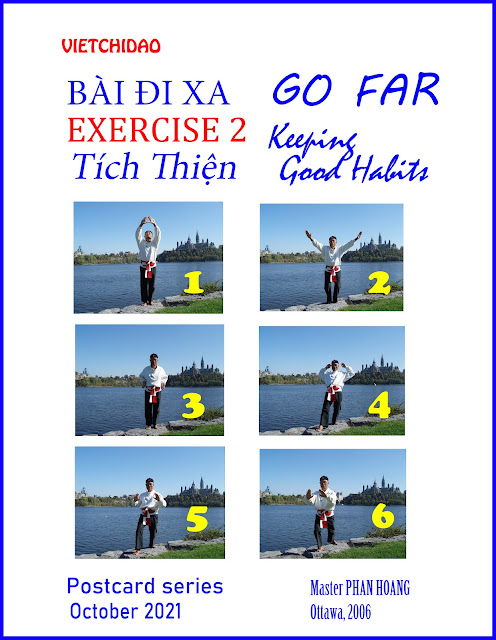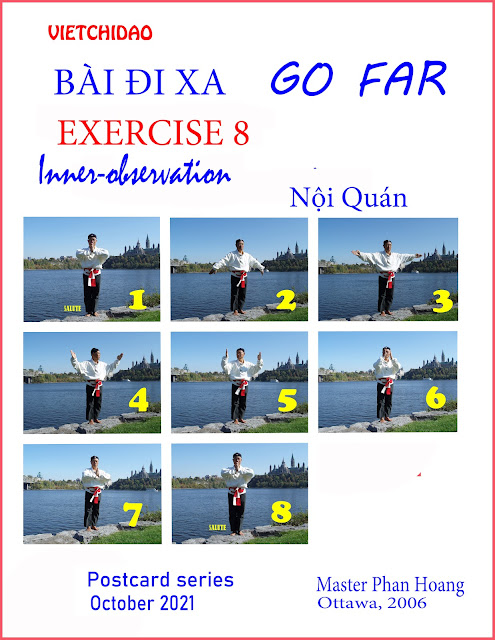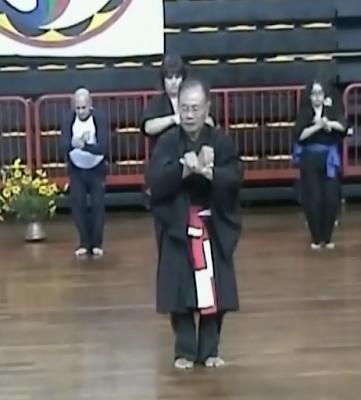23 POST Nov.2022
BAI DI XA – Go far: the traveler sequence
NOVEMBER 2022
|
|
BAI DI XA – Go far This form is taught by GM Phan
Hoang for the first time in November 1997 in Paris, and later in 2013 in Cestas
(F) and Rome (I). Mission: Traveler's
daily training Message: Being able,
being capable to go further
|
|
|
INTRODUCTION
Why is the BAI-DI-XA the traveler sequence? The Truong is a traveler. But how to train while traveling, having only a short time available and space? BAI DI XA is a form for daily
training while traveling, it will allow you to resist better to the fatigue of
travel. It meets four conditions: 1. the four NOs of the traveler: a.
you don't have time; you
don't have space; you don't have a place to train; you don't have anyone to
practice with. b.
Consequently, BAI-DI-XA can
be practiced in a short time, in a very small space, anywhere and by yourself. 2. a few minutes of practice
every day a.
even if you only have five
minutes a day, do not say, "I only have five minutes, it is not it's worth
training"; but use those five minutes to practice BAI-DI-XA. 3. rhythm a.
each movement of the form
can be repeated according to the pattern: 3, 6, 9, 18. 4. The breathing a. tho bung, tho phoi, tho chuyen luan. |
| The movements of BAI-DI-XABai-Di-Xa is an important and powerful form (quyen) common to all the 8 disciplines of Viet-Chi, especially for Viettaichi, Vietkhiphap, and Vietchidao programs. Bai-Di-Xa consists of 8 consecutive movements (exercises), after an opening
gesture called: Nguong-Thien (Looking up to the Sky). The 8 movements
can be performed as independent exercises to building up physical and
inner-energy, strengthening endurance, preventing low-back-pain.
Bai-Di-Xa sends
us a message: If we want to go far on the way of life, being healthy and happy,
we must take great care of our body-and-mind by doing exercises every day. |
| 0 Ngưỡg Thiên Salute 1 Ha-Co The lower
part 2 Tich-Thien Accumulating good energy 3 Tu-Thang Self-Discipline 4 Xoay-Cau Turning the globe 5 Kim-Than Golden body 6 Noi-Van Breathing
inner massage 7 Kich-Dong Stimulating
8 Noi-Quan Profound observation |
RECAPITULATING EXERCISES BAI DI-XA
Phrases and Vietnamese Poem
1.HA-CO. Working inner energy and training the Hara
2.TICH-THIEN. Cultivating wellness and opening up the lungs
3.TU-THANG. Breathing deeply to strengthen the body and overcome difficulties

5.KIM-THAN. Golden body, making our body strong
6.NOI-VAN. Moving the inner energy (stimulate the gallbladder)
7.KICH-DONG. Lung breathing and stomach training to generate power
8.NOI-QUAN. Time for meditation: being quiet and opening the mind
| The many aspects of BAI-DI-XA |
| As a sequence embedded in the fundamentals of the VIETCHI SYSTEM, BAI-DI-XA can be viewed from different aspects and practiced differently depending on the discipline we are referring to. So if we want to practice the form according to a soft way, it means that we are within the VIET TAI CHI discipline. We can continue by analyzing the association of movements with the 5 Elements, the 8 Trigrams, as well as Meridians and Organs, thus obtaining indications on Symbology and Strategy, Spirit and Behavior. If we then add particular attention to some energy points we can make sure that the movements have some influence on some of the most common ailments. |
| The soft way: BAI-DI-XA and VIET-TAI-CHI |
| The slow practice of a quyen
develops both the physical and the energetic and mental levels. However, if one does not have
notions of NOI-CONG, has not delved into concepts related to Breathing Methods,
and is not currently interested in aspects of Martial Art, then we can approach
the movements of BAI-DI-XA in a simpler and more natural way, as in a game. Today is a beautiful day, I'm
going for a walk in a park, in the middle of nature, flowers ... (Nguoc Thien)
... I'm here, in this beautiful country, there's no problem, maybe I don't know
the local language but we'll still understand each other ... (Ha Co) ... Oh
that's nice, there's a nice blue ball, and we can also change direction, it
depends on the situations, this is a game, like we're children. Let's let go,
things that are too serious, too complicated cause stomachache, insomnia,
headache ... (Tich Thien) ... and then we have the waves, the ocean ... (We
Van) ... When we see the ocean we see the energy, so we bring the ocean inside
of us, we do as if we are the ocean with waves. And at the end we don't think
about problems, difficulties, we are doing something exciting, we visit a new
city, we meet new people, we do new things and it's exciting, we think this ...
(Kich Dong) ... and then we go back to being ourselves, the standing, breathing
... (Noi Quan).
The BAI DI XA is composed of 8
independent movements, we do not have to do them all, we can choose a few and
perform them the way we like. Otherwise if we are within a class, we can teach
and yes practice the whole form. |
| The Internal Way: STRENGTH vs POWER |
| Speaking of the Internal Way
we are talking about Energy. Speaking of Energy, however, we need to
distinguish between two concepts: STRENGTH
and POWER. Force (Watt in physics)
represents potential, energy reserve, stored Energy Power (Joules/calories/lumens
in physics) is the ability to put Force into motion. How one is able to use it.
Having the tools to make use of it
Let's take an example. We have
a 20 Watt bulb, this is its Force. But if this bulb is incandescent it will
develop at most 200 lumens, instead if we take a 20 Watt led bulb it can
develop even 2000 lumens with the same Force used. So from our point of view
the led bulb is much more powerful than the incandescent bulb. |
| Accumulate Strength: BAI-DI-XA
and CHI-LUC |
| CHI-LUC is the VIETCHI SYSTEM
discipline that provides us with a program to increase our Strength, to build
and increase our Energy potential through NOI-CONG exercises. We can choose some movements,
such as TU-THANG or KIM-THAN or even KICK-DONG, and repeat them many times (108
or more) strongly and dynamically, as well as having constancy in practice. To work well, several aspects need to be considered. ·
LEGS-maintain
a low position ·
ARMS- work
well with both arms, including forearms, wrists and fingers. ·
HARA – use
specific techniques to work with the DAN-DIEN, for example the HA-CO movement ·
BODY- work
with the whole body, make it strong as steel, for example with the KIM-THAN
movement ·
LEG MOVEMENTS
- if leg movements are involved in the exercise, they must be strong and stable.
|
| Expressing the Energy: BAI-DI-XA and VIET-KHI-PHAP |
| To perform the movements of
BAI-DI-XA according to the discipline of VIET-KHI-PHAP means above all to place
our attention on breathing. Breathing should use KHI, or compressed air obtained
by using the thrust of the active muscles in the exhalation phase, in
combination with a controlled blocking of the glottis at the moment of air
exit. The best results are achieved
through a in-depth study of Breathing Methods. These enable us to put into
motion, to energize the energy potential accumulated through the practice of
CHI-LUC.
Performing the movements of
BAI-DI-XA in a strong (Chi-Luc) and powerful (Viet-Khi-Phap) manner is among
the techniques of NOI-CONG. These enable the development of GONG, contraction
techniques, performed with intention, powerful and effective. |
| Strengthening the impact force: BAI-DI-XA and VO-VIET |
| As we have said, we call
NOI-CONG, the Contraction (GONG) that we apply at the moment we strike while
performing a technique in martial arts. So we don't just use physical
force, but we apply a different way of striking that still uses physical force
as support. Basically we use physical force, to which we apply contraction
according to NOI-CONG to enhance impact. If we want to train according
to this principle, we can, for example, perform the TICH-THIEN movement by
focusing on these aspects: ·
Contracting
the fingers, hand forearm and shoulders, also taking care to contract only the
body parts involved and keeping the other parts relaxed. ·
Force
breathing by correctly applying the Breathing Methods. ·
Stability
and concentration of force also on the advancing foot and leg. ·
Apply
contraction (GONG) at the moment of fist impact. ·
And finally relax
|
| SYMBOLOGY and STRATEGY - SPIRIT and BEHAVIOR |
| Starting from the following
diagram that relates the movements of BAI-DI-XA to BAT-QUAI, according to the
sequence of execution, it is then possible to create the Table of
Correspondences between the movements and their symbology. Following the directions in
the chart, one can practice the movements, trying, from time to time, to deepen
the study of breathing, the organs involved, the strategy suggested by the
symbols, and finally the association with the spirit, which suggests valuable
pointers on behavior.
The suggestions described in
the table, serve to help those who wish to study this form in depth. Each
person, can approach the study according to his or her own nature, from the
aspect that is most congenial to him or her, and then broaden the gaze to
further aspects in order to enter more and more into the spirit of the
sequence. |
|
EXERCISE |
BREATHING |
ORGAN |
SYMBOL Strategy |
SPIRIT Behavior |
|
1
Ha-Co Earth --- --- |
Belly breathing Abdomen Tho-Bung
|
Hara, Abdomen Bas-ventre Dan-dien |
The Turtle Way La Voie
de la Tortue Thần Quy Kiến-Tạo |
Patience Patience Trì-Nhẫn
Thành Công |
|
2
Tich-Thien Mount -------- |
Lungs breathing Poumons Tho-Phoi
|
Lungs Poumons Phoi |
Benevolent Monkey Le Singe Bienveillant Lão Hầu Độ Nhân |
Compassion, Compassion Đại-Bi Quảng-Độ |
|
3
Tu-Thang Sky -------- |
Belly breathing Abdomen Tho-Bung
|
Kidneys,Urinary bladder Reins,
Vessie Than,
Bang-quang |
Dragon Power Puissance
du Dragon Thiên
Long Thần Lực |
Being True
&Confident Etre Vrai
et Confiant Thành-Tín Đại-Đạo |
|
4
Xoay-Cau Lake --- --- -------- |
Lungs breathing Poumons Tho-Phoi
|
Spleen, Pericardium Rate,
Envelope du cœur Ty,
Tam-bao |
Strategy
of the Crane Stratégie
de la Grue Bạch Hạc
Lập Kế |
Beauty in all things Beauté
dans tout Thiện-Mỹ Chân-Toàn |
|
5
Kim-Than Fire -------- |
Belly breathing Abdomen Tho-Bung
|
Liver, Gall bladder Foie,
Vésicule biliaire Can, Dom
|
Unicorn Rightness Droiture
de la Licorne Cường Lân
Trực Chỉ |
Loyalty Loyauté Đại-Nghĩa
Chân-Thực |
|
6
Noi-Van Water --- --- |
Wavingbreathing Respiration
ondulatoire Tho-Chuyển-Luân
*
|
Large
& Small intestines Intestins Đại-trường, Tiểu-trường |
Sacred Snake Serpent
Sacré Thần-Xà
Bảo-Ngọc |
Deep
Within Profondeur d ‘esprit Thâm-Xâu Trường Lực |
|
7
Kich-Dong Thunder --- --- |
Lungs breathing Poumons Tho-Phoi
|
Stomach Estomac Vi (Da-day) |
Moving Tiger Tigre en
action Lão Hổ Xuất
Động |
Courage Courage Dũng-Mãnh
Lược-Thao |
|
8
Noi-Quan Wind --------
|
Belly breathing Abdomen Tho-Bung
|
Heart Coeur Tam (Tim) |
Vision of Phoenix Vision du
Phénix Thanh Phụng
Trí Cao |
Vision Vision Viễn-Kiến
Tuệ-Giác |
|
|
LIST OF BOOKS By Master Charles Phan
Hoang With
Master Tue-Chu Edio Catoni |
|
|
1-VIET-CHI -Eight powerful disciplines (English)
2-TINH-MAT -Energie
Interne Cachée (French)
3-SINH-LO -La voie pour la grandeur de
l’amitie’ (French) 4-SƯ- LỘ, KỲ MÔN -An Exceptional Way For Martial Art
Teachers (English
and Italian) 5-HA THU -Autumn
(English, French, Italian)
6-TRONG DONG - Winter Training (English, French, Italian) 7-TIEP XUAN - Power of SPRING (English, French, Italian) 8- KỲ LO QUYỀN -Training in a Fabulous Way (English, French, Italian) 9- THAN-XA -The Sacred Snake (English, French, Italian) 10-THIEN LONG - The Celestial Dragon (English, French, Italian) 11-TAM PHAP -The Great Way (English, French, Italian) 12-NGOC DINH -The Jade Mountain (English, French, Italian) 13-VAN LY -Ten Thousand Miles (English, French,
Italian) 14- FIFTY YEARS ON THE WAY (May 2022)
|
|
|
VIET CHI INSTITUTE RECOGNIZED BY GM
PHAN HOANG VIETCHI W.O. Available
Books written by Grand Master Charles Phan
Hoang For
information: info@vietchiinstitute.org |




















